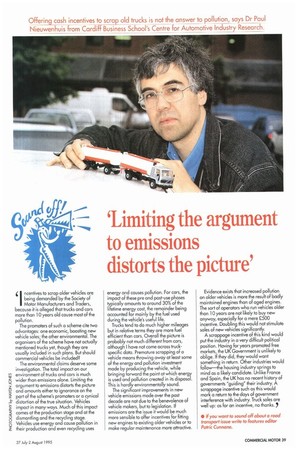'Limiting the argument to emissions distorts the picture'
Page 41

If you've noticed an error in this article please click here to report it so we can fix it.
t ncentives to scrap older vehicles are I being demanded by the Society of Motor Manufacturers and Traders, because it is alleged that trucks and cars more than 10 years old cause most of the pollution. The promoters of such a scheme cite Iwo advantages: one economic, boosting new vehicle sales; the other environmental. The organisers of the scheme have not actually mentioned trucks yet, though they are usually included in such plans. But should commercial vehicles be included?
The environmental claims deserve some investigation. The total impact on our environment of trucks and cars is much wider than emissions alone. Limiting the argument to emissions distorts the picture and amounts either to ignorance on the part of the scheme's promoters or a cynical distortion of the true situation. Vehicles impact in many ways. Much of this impact comes at the production stage and at the dismantling and the recycling stage. Vehicles use energy and cause pollution in their production and even recycling uses energy and causes pollution. For cars, the impact of these pre and post-use phases typically amounts to around 30% of the lifetime energy cost, the remainder being accounted for mainly by the fuel used during the vehicle's useful life. Trucks tend to do much higher mileages but in relative terms they are more Fuel efficient than cars. Overall the picture is probably not much different from cars, although I have not come across truckspecific data. Premature scrapping of a vehicle means throwing away at least some of the energy and pollution investment made by producing the vehicle, while bringing forward the point at which energy is used and pollution created in its disposal. This is hardly environmentally sound. The significant improvements in new vehicle emissions made over the past decade are not due to the benevolence of vehicle makers, but to legislation. If emissions are the issue it would be much more sensible to offer incentives for fitting new engines to existing older vehicles or to make regular maintenance more attractive. Evidence exists that increased pollution on older vehicles is more the result of badly maintained engines than of aged engines. The sort of operators who run vehicles older than 10 years are not likely to buy new anyway, especially for a mere 2500 incentive. Doubling this would not stimulate sales of new vehicles significantly. A scrappage incentive of this kind would put the industry in a very difficult political position. Having for years promoted free markets, the UK Government is unlikely to oblige. If they did, they would want something in return. Other industries would follow—the housing industry springs to mind as a likely candidate. Unlike France and Spain, the UK has no recent history of governments "guiding" their industry. A scrappage incentive such as this would mark a return to the days of government interference with industry. Truck sales are well up: as for an incentive, no thanks. /
• If you want to sound off about a road transport issue write to features editor Patric Cunnane.
























































































